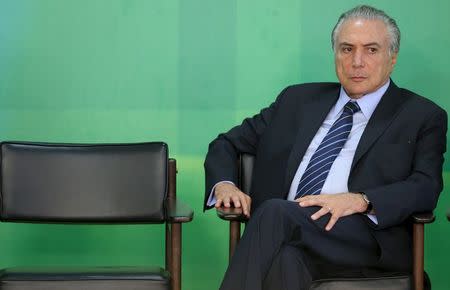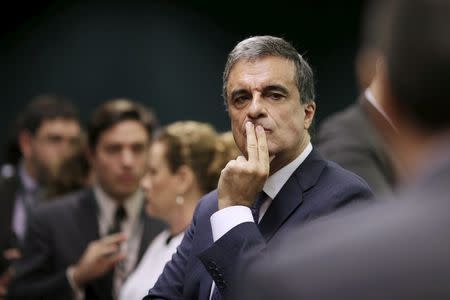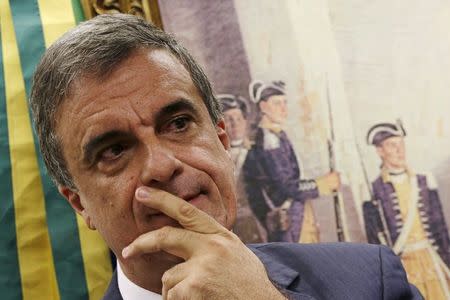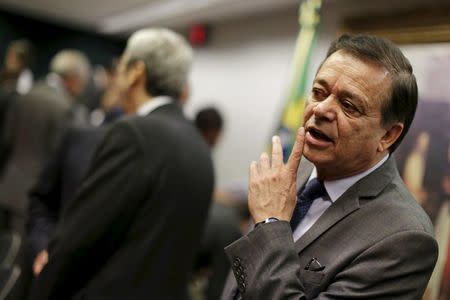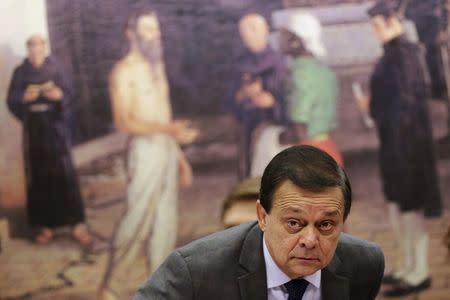Brazil's Temer urges unity government; impeachment ruling looms
By Maria Carolina Marcello BRASILIA (Reuters) - Brazil's vice president called for a government of national unity in a message that was released on Monday apparently by mistake, further muddying the waters of a political crisis just hours before a crucial decision in President Dilma Rousseff's impeachment case. Vice President Michel Temer's 14-minute audio message sent to members of his own Brazilian Democratic Movement Party (PMDB) via the Whatsapp messaging app showed that Temer is preparing to take over if Rousseff is soon forced from office. The audio was posted on the website of the Folha de S.Paulo newspaper and confirmed to Reuters by Temer's aides as authentic. Aides said it was accidentally released and they quickly sent another message asking legislators to disregard it. Later on Monday, members of a congressional committee are expected to vote in favor of sending Rousseff to trial for breaking Brazil's budget laws in the first major step toward her possible removal from office. The battle over Rousseff's impeachment has polarized the nation of 200 million people and brought the government of Latin America's largest economy to a virtual standstill. While carefully stating his words did not anticipate the outcome of the impeachment process, Temer said in his message: "The big mission going forward is the pacification of our nation, the unification of our country." "We need a government of national salvation and national unity," Temer said in the audio. "We need to unite all the political parties, and all the parties should be ready to collaborate to drag Brazil out of this crisis." Rousseff's aides said they expect a majority of the 65-member committee to recommend that Brazil's first female president be impeached on charges of manipulating budget accounts to boost her reelection prospects in 2014. The government is trying to convince lawmakers to vote against impeachment or abstain when the full lower house of Congress votes on the issue on Sunday by offering government jobs that became vacant when Rousseff's main ally, the PMDB, broke with her two weeks ago. Supporters and opponents of the embattled leftist leader gathered in the capital ahead of Monday's impeachment decision. Bracing for clashes, police erected a 1-km (0.6 mile) long metal fence down the middle of the wide grass esplanade in front of Congress to separate rival demonstrators. If Rousseff's opponents are successful, it would be the first impeachment of a Brazilian president since 1992 when Fernando Collor de Mello faced massive protests for his ouster on corruption charges and resigned on the eve of his conviction by the Senate. "There are sufficient indications to proceed with impeachment," Congressman Jovair Arantes, the committee's rapporteur said about Rousseff's case on Monday. Attorney general Jose Eduardo Cardozo, addressing the raucous committee meeting, said Arantes had not managed to pinpoint a crime by Rousseff and the move to oust her was unconstitutional: "It is absurd to remove a legitimately elected president for an accounting problem." MARGIN OF VICTORY KEY A survey released on Friday by Brasilia-based consultancy ARKO Advice found that 33 of the 65 committee members will vote for impeachment, with 22 against and 10 undecided. The margin of victory will be important in swaying undecided lawmakers in the lower house plenary vote, where recent polls show neither side has guaranteed enough support. Rousseff, a former leftist guerrilla, has denied any wrongdoing and rallied the rank and file of her Workers' Party to oppose what she has called a coup against a democratically elected president. But, caught in a political storm fueled by Brazil's worst recession in decades and its biggest ever corruption scandal, Rousseff has lost key coalition allies in Congress. Her mentor and predecessor as president, Luiz Inacio Lula da Silva, himself facing a graft investigation, will lead a big protest in Rio de Janeiro seeking to whip up popular opposition to impeachment at around the time of Monday's committee vote. Rousseff's opponents need 342 votes, or two thirds of the house, to approve impeachment and send the process to the next stage in the upper chamber. If a simple majority of senators then votes in favor of impeachment, Rousseff would be temporarily suspended from office and Temer would become acting president pending a six-month trial in the Senate. (Additional reporting by Brad Brooks; Writing by Anthony Boadle; Editing by Daniel Flynn and Alistair Bell)

